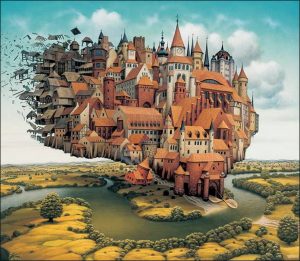There is no such thing as a pocket utopia.
Consider the French aristocracy before the revolution – well fed, well clothed, well housed, well educated – brilliant lives. One could say they lived in a little utopia of their own. But we don’t say that, because we know their lives rested on a base of human misery, peasants toiling in ignorance and suffering. And we think of the French aristocracy as parasites, brutal, stupid, tyrannical.
But now the world is a single economy. Global village, made in Thailand! And we stand on little islands of luxury, while the rest – great oceans of abject misery, bitter war, endless hunger. We say, But they are none of our affair! We have our island. …
What a cheat utopias are, no wonder people hate them. Engineer some fresh start, an island, a new continent, dispossess them, give them a new planet sure! So they don’t have to deal with our history. Ever since More they’ve been doing it: rupture, clean cut, fresh start.
So the utopias in books are pocket utopias too. Ahistorical, static, why should we read them? They don’t speak to us trapped in this world as we are, we look at them in the same way we look at the pretty inside of a paperweight, snow drifting down, so what? It may be nice but we’re stuck here and no one’s going to give us a fresh start, we have to deal with history as it stands, no freer than a wedge in a crack. …
Must redefine utopia. It isn’t the perfect end-product of our wishes, define it so and it deserves the scorn of those who sneer when they hear the word. No. Utopia is the process of making a better world, the name for one path history can take, a dynamic, tumultuous, agonizing process, with no end. Struggle forever. … Utopia is when our lives matter. …
I grew up in utopia, I did. California when I was a child was a child’s paradise, I was healthy, well fed, well clothed, well housed, I went to school and there were libraries with all the world in them and after school I played in orange groves and in Little League and in the band and down at the beach and every day was an adventure, and when I came home my mother and father created a home as solid as rock, the world seemed solid! And it comes to this, do you understand me – I grew up in utopia.
But I didn’t. Not really. Because while I was growing up in my sunny seaside home much of the world was in misery, hungry, sick, living in cardboard shacks, killed by soldiers or their own police. I had been on an island. In a pocket utopia. It was the childhood of someone born into the aristocracy, and understanding that I understood the memory of my childhood differently; but still I know what it was like, I lived it and I know! And everyone should get to know that, not in the particulars, of course, but in the general outline, in the blessing of a happy childhood, in the lifelong sense of security and health.
So I am going to work for that. And if – if! if someday the whole world reaches utopia, then that dream California will become a precursor, a sign of things to come, and my childhood is redeemed. I may never know which it will be, it might not be clear until after we’re dead, but the future will judge us! They will look back and judge us, as aristocrats’ refuge or emerging utopia, and I want utopia, I want that redemption and so I’m going to stay here and fight for it, because I was there and I lived it and I know.
Archive | June 18, 2019
Leonard Cohen Month, Songs 35-36
June 18:
Chelsea Hotel No. 2 (1974):
Never Any Good (1997):

